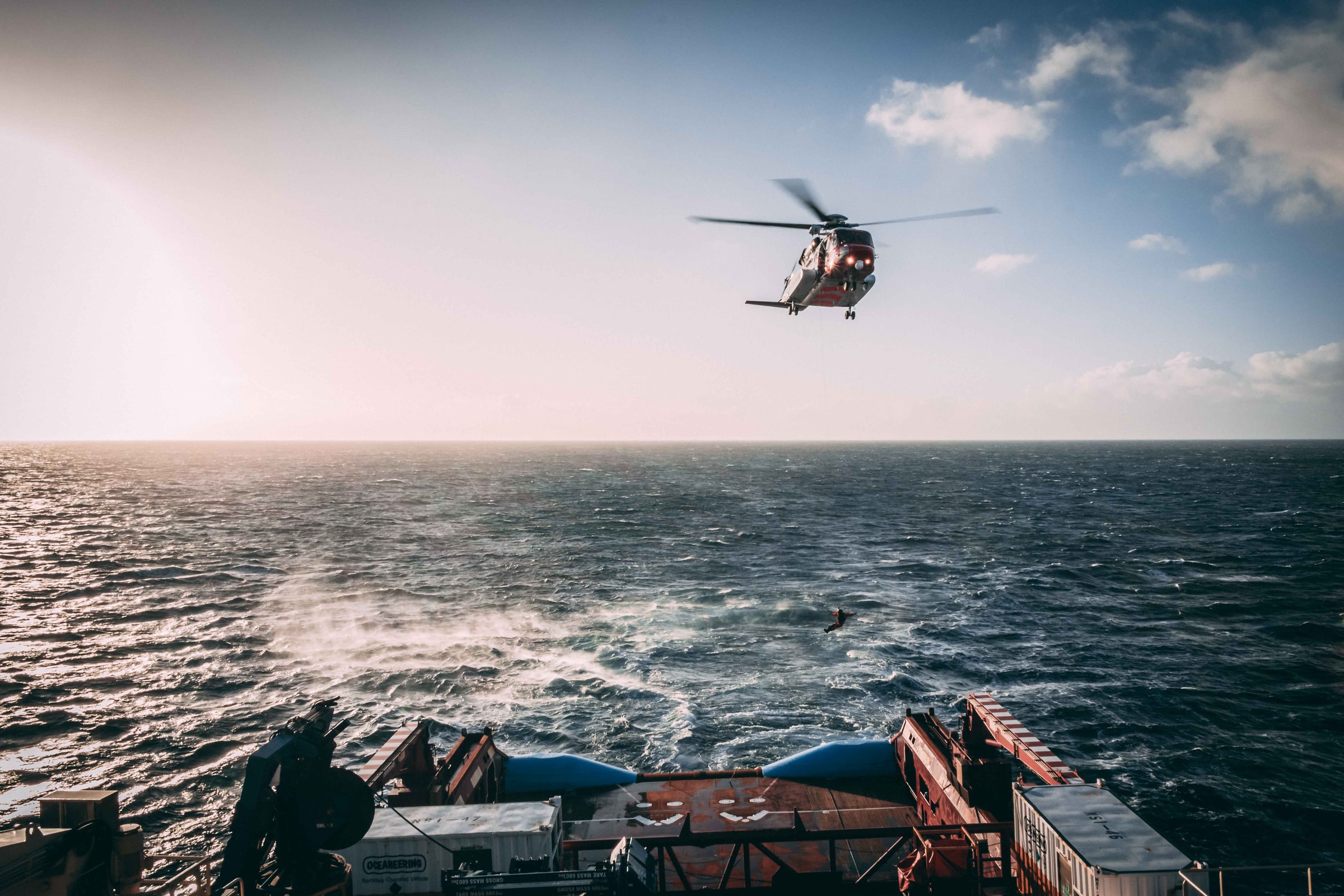
The Impact of Research in International Law and Migration: Legal Implications for the Situation of Migrants and Refugees
Throughout history, people have always migrated from one place to another. Ever since the earliest humans began to spread from Africa thousands of years ago, people have been on the move, driven by climate, food availability, and other environmental factors [1]. Today about three percent of the world’s population live outside of their country of origin due to famine, climate change, persecution, security, demography, poverty and human rights abuses. Within this broadly mixed category of people on the move, refugees fleeing persecution and gross human rights violations in their home country represent the most vulnerable group, and are often unable to obtain personal identification and travel documents. As uninvited aliens, refugees are often perceived as a menace to the peace and internal security of the host State while also having no community and no linkage with their home country. As such, they are treated as outsiders whose claims must first be carefully assessed in order to decide whether they are legitimate and worthy of assistance. States’ endeavours to impose ever more robust barriers against those who seek to enter their national territories continue to accelerate and have therefore led to a ‘tension between generosity towards those at home and wariness of those from abroad’ [2].
Europe in the 20th and 21st century: from a continent of emigrants to a continent of immigrants
Whilst immigration to Europe from other continents and countries was modest during the first half of the twentieth century, more than 35 million people emigrated from Europe within the same period. Immigration began to increase between 1950 and 1970 as European States assumed increased responsibilities with respect to the huge number of post-war refugees. Since the early 1990s, a sharp increase in asylum applications has progressively been recorded among Western countries, particularly in Western Europe.
In 2021, 80 million people worldwide were forcibly displaced with developing countries hosting the vast majority (85%) of the world’s refugees. In the last decade, European countries have adopted restrictive and securitarian policies to keep migrants and refugees (especially those from Syria, Afghanistan, and the African continent) outside their borders. However, because of increased Russian aggression in Ukraine as of February 2022, which has provoked the largest and fastest exodus of people since the end of World War II, Europe now hosts more refugees than any other region in the world.
Migration to Europe by the sea – legal framework versus reality
When we talk about migration, the conversation often focuses on humanitarian, ethical, and political aspects, ones which are covered in media and public discourse. Several disciplines, such as philosophy, history, geography, sociology, economics and political science deal with migration. Perhaps due to the relative inaccessibility of legal text (among many other factors), the legal aspects regarding migration may not be as well-known or publicized, and therefore not as often discussed. However, the role of law deserves and requires far more attention in the dialogue regarding migration.
My research interests primarily lie in the area of international law, human rights law, and migration studies. Over the past years, I have started focusing on practices of ‘externalization of borders’ and ‘contactless controls’ through which European States delegate to third countries the interception, rescue, and containment of migrants and refugees, thereby limiting onwards movement to Europe. Barriers to (mixed) migratory flows continue to be erected, employing measures such as restrictive visa policies, carrier sanctions, extraterritorial sea patrolling, accelerated removal processing, physical push-backs, and lack of access to fair asylum determination procedures, hindering access to effective remedies.
All these practices often come into conflict with international and European law as well as primary and secondary European Union (EU) legislation, which clearly contain provisions for refugee protection. The main instruments of this protection are, for instance, the 1951 Geneva Convention Relating to the Status of Refugees and its 1967 Protocol, which have been signed by 146 and 147 States respectively.
Why migration by sea is particularly critical
Arrival by sea is one of the main streams of my research. Although the number of people reaching Europe by sea is relatively small, annually thousands of people lose their lives at sea, trapped in the containment net woven by European States in cooperation with third countries of origin or transit of migrants, such as Libya, Tunisia, Morocco, and Turkey. Since 2014, 23,860 migrants have been recorded missing in the Mediterranean. In reality, this tragic number could be much higher than reported. In 2021, the UN Human Rights Committee found Italy responsible for failing to protect the lives of 200 persons (including 60 children) who drowned in the Mediterranean due to the unjustifiable delays in the succours and insufficient aid by Maltese and Italian authorities.
Rescuing migrants at sea while fighting a pandemic: How should legal assistance look for Refugees in times of public emergency?
Due to the Covid-19 crisis, national healthcare and bureaucratic systems are being overwhelmed, causing an increasing number of European governments to both declare a state of emergency and adopt measures constraining free movement of persons at land and maritime borders. It is undeniable that, in the event of public emergencies, policies aimed at stemming migratory flows and curtailing arrivals should be assessed within a general framework of necessity and urgency. Nevertheless, it is crucial to strengthen States’ collective effort to preserve life and rethink solidarity in Europe with clear and binding mechanisms to ensure access to territory. In case of migration by sea, this implies a dignified disembarkation of migrants from sea to land. This means, for instance, implementing an effective relocation of asylum seekers, as well as clarifying what duties States have to people at sea. In far too many cases both before and after the spread of Covid-19, people have been left to die at sea or subject to emotionally and physically taxing stand-offs on board rescuing vessels waiting for a State allowing disembarkation while those who survive are either pulled back to Libya or Tunisia with the undergoing cooperation and support of European States.
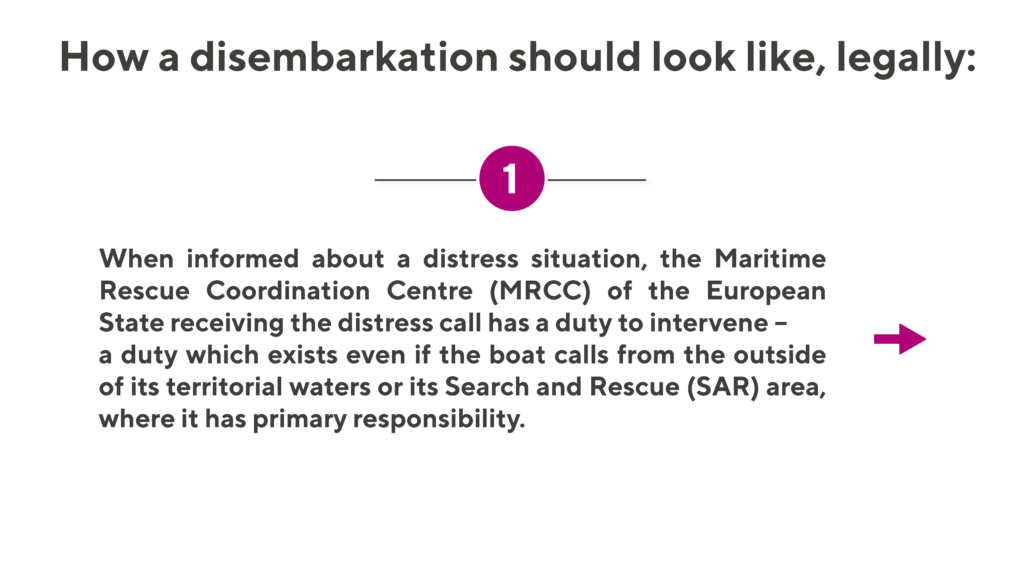
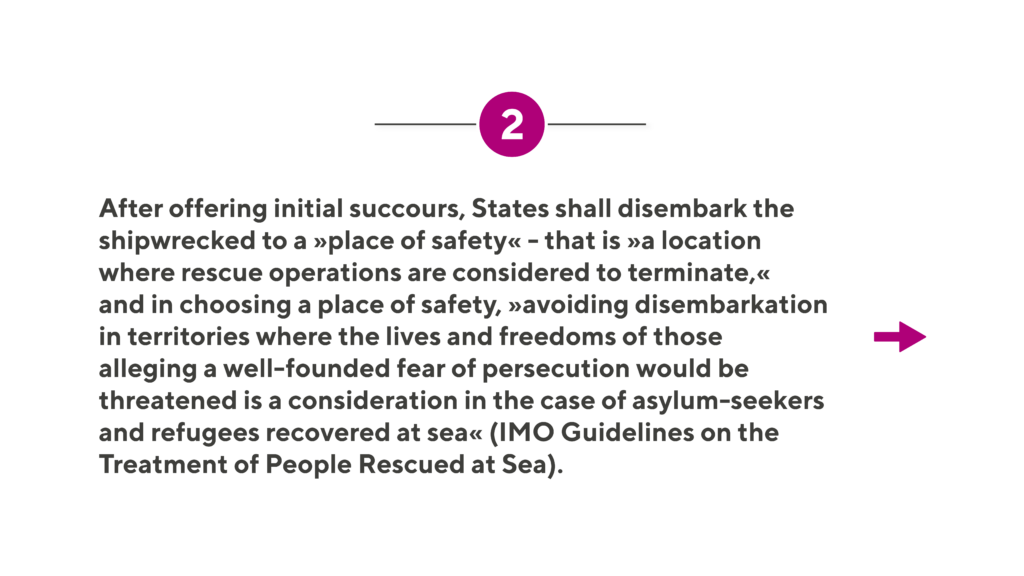
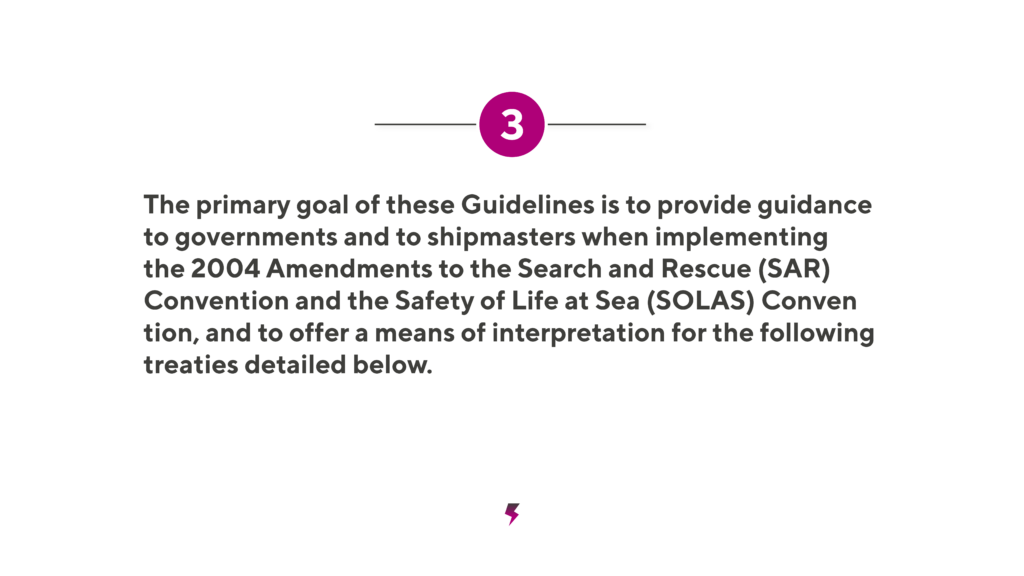
What is the role for international law? – Let’s turn to the text
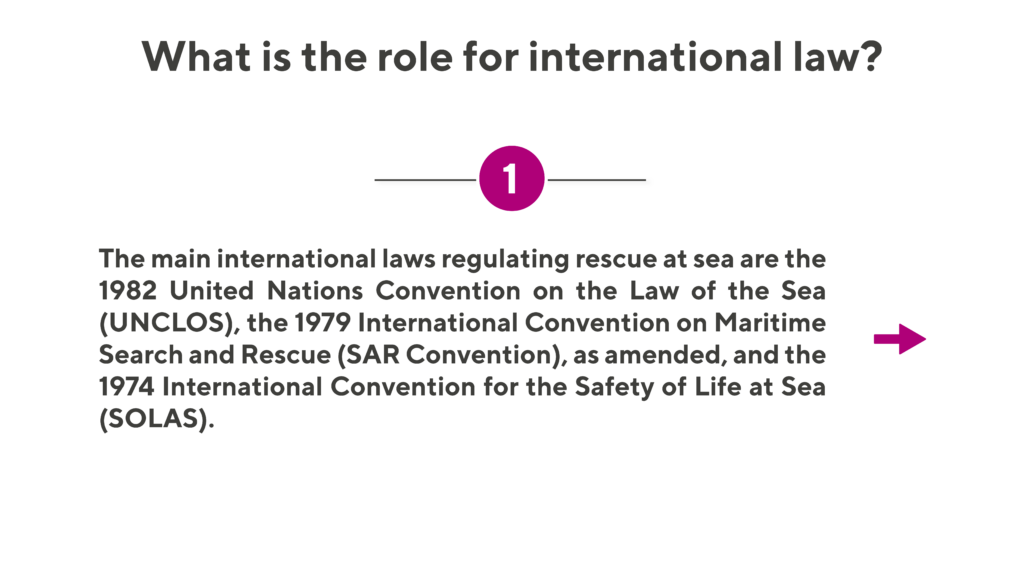
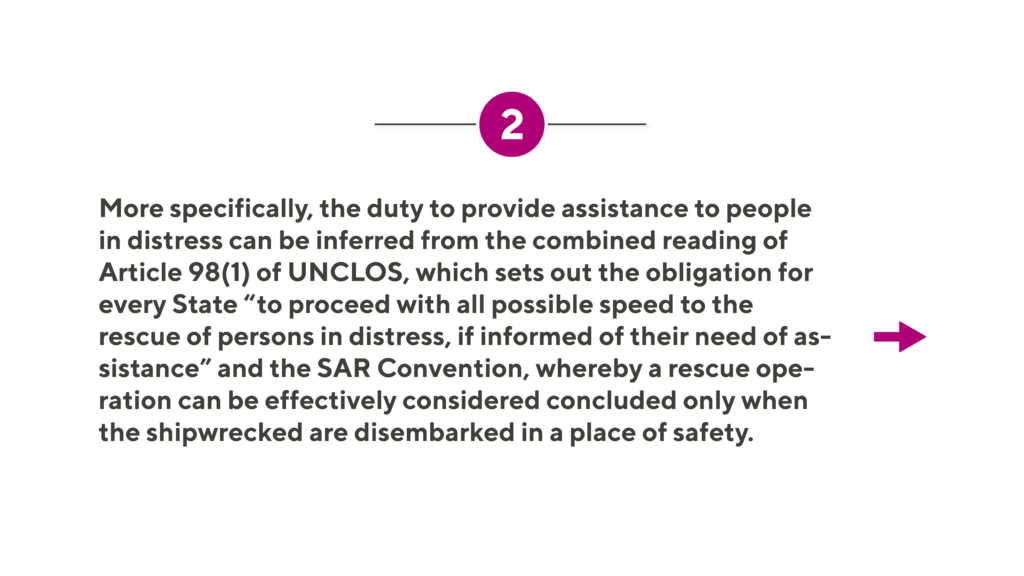
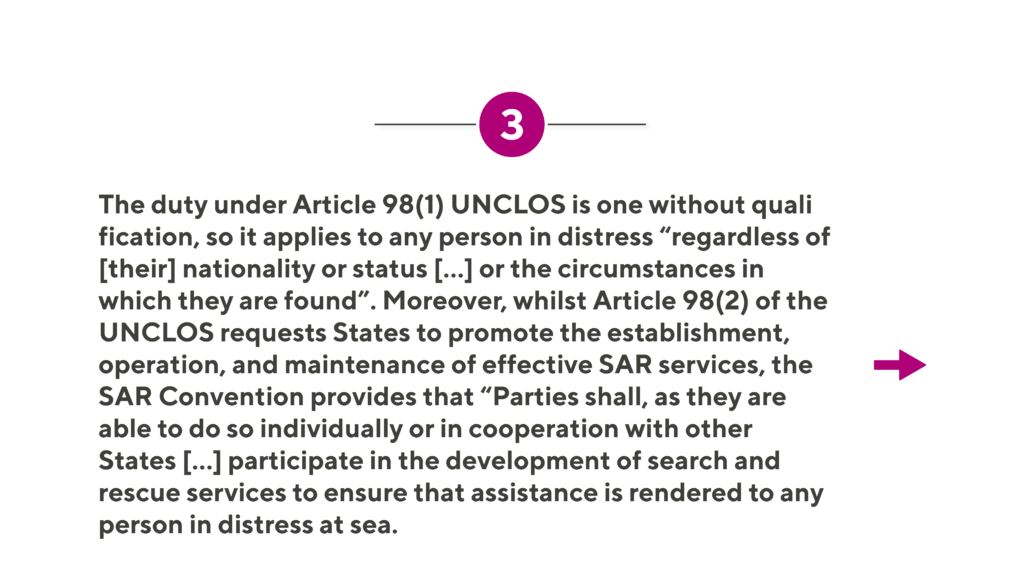
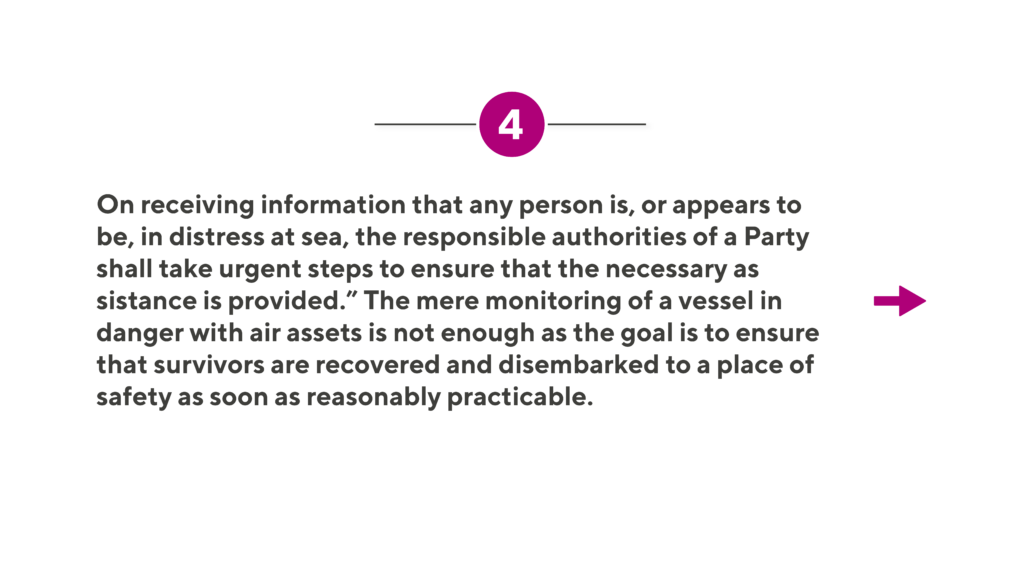
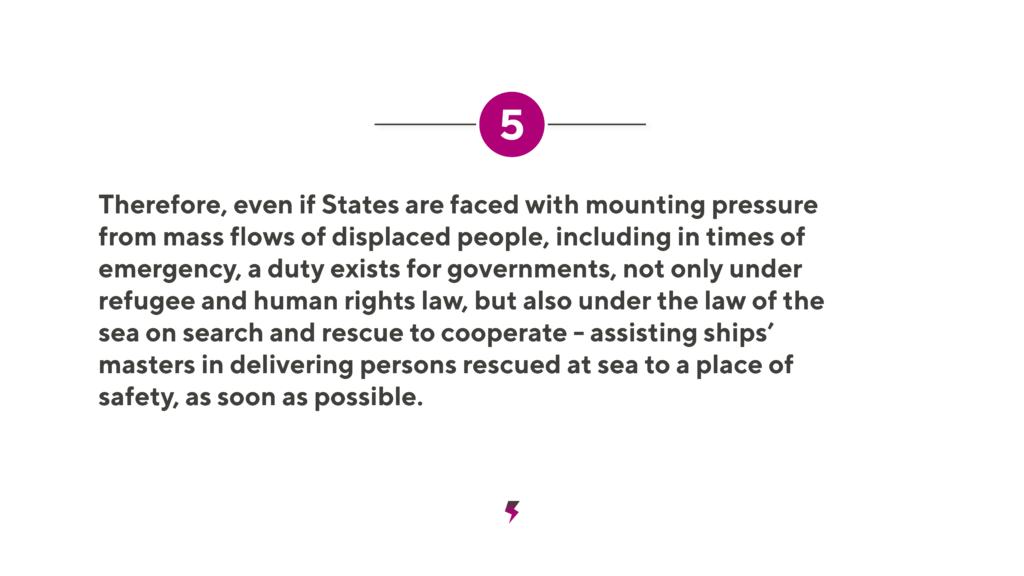
Migrants’ rights in times of emergency: Some concluding observations
It is undeniable that the different bodies of law suggest, at times, seemingly contrasting ways to deal with the issue of irregular migration at sea. However, despite these ambiguities in the existing law, my research aims to stress how the humanitarian needs of migrants and refugees should stimulate prompt practical responses. Therefore, the duty to cooperate internationally combined with the duty to relieve the shipmaster of a vessel in a timely manner imply that the flag State (which is the country where a company registers its commercial and merchant ships) should also fulfil its obligation to effectively support coastal States in finding prompt solutions, by assisting for example in the reception of the shipwrecked if needed. Any action or inaction aimed at impeding the conclusion of rescue operations – including disembarkation in a place of safety where fundamental rights are respected – regardless of the State having primary responsibility for the coordination of the operation, would be in contrast with international law and potentially engage State responsibility.
Pushing back migrants to an unsafe country (either directly or indirectly) is not a legal option. Leaving traumatized migrants for several weeks on board of rescuing vessels without granting authorization to land in a safe port is not a viable option either. In rejecting a fragmented approach to maritime obligations, States should instead prioritise a systemic interpretation of their duties at sea, thus making their border control measures consistent with international human rights and refugee law taking into account the diverging policy interests that are at stake.
Migration and Elections
While ‘emergencies’ and ‘crises’ constantly change and take different names, what I have repeatedly noted during my work and research activity is the continuous exploitation of refugees and migrants’ movements by different governments to serve their own agendas and interests, thus ignoring their legal obligations toward people on the move, as well as the humanitarian and ethical dimensions of these flows. Such trend shows how States use various refugee crises as a bargaining chip against each other, and how politicians manipulate immigration policies for electoral reasons, as their behaviour depends on the share of anti-immigrant voters. Politicization of immigration issues and political conflict over immigration – primarily due to radical right populist parties – follow a political logic and must be attributed to parties and party competition rather than to ‘objective pressures’ [3]. Immigration has thus become a ‘hot topic’, which is strategically used by governments and politicians in the electoral arenas and in some national referenda (e.g, the Brexit campaign).
Within this framework, States displace migration controls beyond borders, to the high seas or the territorial waters of a third country, where the grounds for both exercising jurisdiction and engaging extraterritorial human rights obligations are arguably more tenuous. Whereas States seem to be committed to altering geographies and moving borders, I wish to stress that they cannot be divested of both their previously-contracted human rights obligations and their international responsibility (either direct or indirect) every time they operate beyond borders, and offshore, or outsource, migration controls to the authorities of a third State.
Therefore, considering the role that law can play in promoting refugee rights, the suggestions developed throughout my research can foster continuous progress in refugee protection and improve the understanding of State obligations towards migrants and refugees not only to the benefit of courts and tribunals, but also legal practitioners and policy-makers. Even in times of emergency (e.g., wars, terrorist attacks), massive inflows, and unprecedented public health crises, States continue to be bound by their international law obligations (including the duty of rescue at sea and disembarkation in a safe place) and can be held responsible for violation of fundamental rights of people, as several cases before international human rights monitoring bodies and courts show. States are thus called to elaborate innovative, non-discriminatory, and adaptable solutions to new global challenges, while accounting for different circumstances.
Rising to the challenge: Reformation of Migration Policies
To conclude, Europe is currently experiencing another immense humanitarian emergency provoked by the conflict between Russia and Ukraine. This has triggered the solidarity of European civil society and governments and the activation, for the first time in 21 years, of the EU Temporary Protection Directive, which grants a residence permit, access to education, health care and the labour market to people fleeing the conflict. Concerns have been raised over the discriminatory treatment of Ukrainians and non-Ukrainians, victims of the same conflict (contrarily to the spirit of international refugee law), as well as the lack of political willingness by EU Member States in providing the same level of protection to displaced people from outside Europe in the recent past (eg. refugees from Syria, Afghanistan, Libya, Tunisia, Iraq). At the same time, one cannot but note that the volunteers welcoming Ukrainian refugees are often the same people attacked for assisting refugees in the Mediterranean, where people continue either to be pushed-back or lose their lives (e.g., since January 2022, 818 persons have already drowned in the desperate attempt to seek refuge in Europe) [4].
Therefore, I think the Ukrainian crisis could be an extraordinary opportunity for the EU to reform its migration and asylum policies in a fairer direction creating legal channels for safe access of refugees to the European territory. Indeed, while the EU was in a state of deadlock for years over common action in the field of asylum, it has rapidly decided to use its Temporary Protection Directive granting refugees from Ukraine an immediate protection status. My hope is thus that EU leaders will take a clear commitment like this in the future showing the same degree of solidarity and generosity towards all displaced people seeking refuge in Europe either by land or by sea, thus rejecting any double standard in the treatment of people coming from outside Europe.
Sources
[2] M Fullerton, ‘The International and National Protection of Refugees ’ , in H Hannum (ed) Guide to International Human Rights Practice 4th edn ( Transnational Publishers , 2004 ) pp. 246
[3] Source: Edgar Grande, Tobias Schwarzbözl & Matthias Fatke (2018): Politicizing immigration in Western Europe, Journal of European Public Policy
[4] https://missingmigrants.iom.int/region/mediterranean
